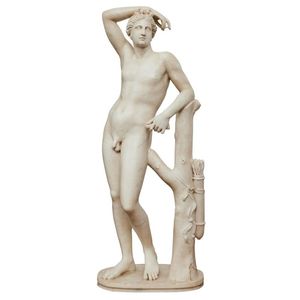19th Century Italian White Marble Statue of Medici Apollo
An Italian white marble statue of the Medici Apollo (Apollino), 19th century, after the antique, the naked deity with his right arm behind his head, standing by a stump from which is slung his quiver and arrows, on integral oval marble base. Height 150 cm. Provenance: Andre & Cecile Fink Antiquaries, Sydney, 2008, other notes: the Medici Apollo, a Roman copy of a Hellenistic original is now in the Uffizi in Florence, but was found complete in Rome in the 17th century and originally part of the Borghese collection, then moved to the Medici collection in the Villa Medici. Held in high regard through the 18th century it was one of the most copied Roman statues. The poet Shelley said of it 'it is difficult to conceive anything more delicately beautiful?'
You must be a subscriber, and be logged in to view price and dealer details.
Subscribe Now to view actual auction price for this item
When you subscribe, you have the option of setting the currency in which to display prices to $Au, $US, $NZ or Stg.
This item has been sold, and the description, image and price are for reference purposes only.
- Hellenistic - The Hellenistic period is a period in ancient Greek history
that began after the death of Alexander the Great in 323 BCE and lasted until
the Roman conquest of Greece in 146 BCE. It is named after the Greek word
"Hellenistic," which means "to imitate Greeks."
During the Hellenistic period, the Greek world expanded
beyond the boundaries of Greece and encompassed the territories conquered by
Alexander the Great, including Egypt, Persia, and parts of India. The period
was marked by a fusion of Greek culture with the cultures of these conquered
territories, resulting in a diverse and cosmopolitan society.
The art and architecture of the Hellenistic period were
marked by a new sense of realism and individuality. Artists and architects
experimented with new techniques and styles, and the incorporation of new
materials such as bronze and glass. A number of the best-known works of Greek sculpture belong to this period, including Laocoon and his Sons, Venus de Milo, and the Winged Victory of Samothrace. - Apollo - Apollo is the Greek and Roman god of the sun, and patron of music and poetry. He is often depicted with a lyre.
This item has been included into following indexes:
